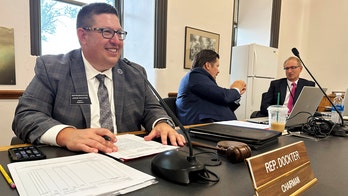
Demonstrators in Alabama bow their heads in prayer during a June demonstration to protest the new state law against illegal immigration. The law is said to be the strictest state-level immigration law in the country. (AP)
Alabama’s new immigration law will subject all immigrants to harassment, says a lawsuit filed in Montgomery County Circuit Court.
The lawsuit is filed on behalf of five plaintiffs, who include two undocumented immigrants, two Mexican immigrants who are U.S. citizens and the spouse of an undocumented worker. The lawsuit maintains that the law violates provisions in the Alabama Constitution that encourage immigration.
"Our point is these people have individual rights that cannot be tread upon by the Alabama Legislature," said Thomas Drake, a Cullman attorney representing the plaintiffs.
A statement from Alabama Attorney General Luther Strange's office said they were reviewing the complaint and would defend the law "vigorously."
Signed by Gov. Robert Bentley on June 9, the new immigration law makes it a crime to be an undocumented immigrant in Alabama and allows law enforcement to detain individuals they have a "reasonable suspicion" of being in the country illegally.
The law also makes it illegal to give undocumented immigrants rides and requires school districts to check on the immigration status of students who enroll.
The law is modeled on Arizona's immigration law, parts of which have been blocked by federal court.
The American Civil Liberties Union, the Southern Poverty Law Center and the National Immigration Law Center filed suit earlier this month to overturn Alabama’s immigration law.
The lawsuit seeks class action status to allow the plaintiffs to represent all those who may be affected by the new law. The suit states that the defendants could bring harm to the plaintiffs because as state officials they have a duty to enforce the law the plaintiffs seek to block.
Meanwhile, the Alabama Farmers Federation and Alabama Employers for Immigration Reform plan to host a series of seminars to help the state’s farmers, as well as other employers, understand the new law.
David Cole, director of agricultural legislation for the federation, says farmers want to make sure they are in compliance with the new regulations, and need to understand how the law will impact the workforce so they can make plans.
This story contains material from The Associated Press.
Follow us on twitter.com/foxnewslatino
Like us at facebook.com/foxnewslatino




